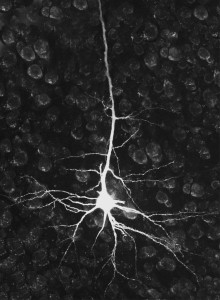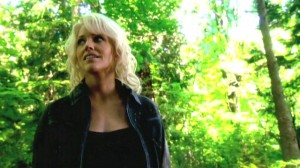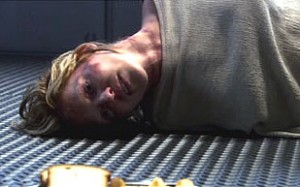[Enjoy this post from guest author Nathaniel Hanks – part two in a continuing series! (Part 1)]
“You’re nothing but a pack of neurons”
—Francis Crick
Lots of science must go into making a self-aware Cylon, more than we have at the start of the 21st century. Sure, Cylons only exist in the BSG universe. But the technology which allows for synthetic self-awareness extends from our modern neuroscience of consciousness. Once scientists understood that consciousness ‘sits’ in the brain, they began looking to the brain’s structure and neural functioning for answers. While certainly playing the ‘Trust Me It’s Complicated’ card, BSG does let us peek under the ‘toaster’ to see how consciousness might be working.
Go back 3.5 billion years and consciousness is nowhere on the planet. Somewhere between the early replicating cells and now, consciousness emerged, and neuroscience is trying to figure out how. There is not even nearly as complete a theory of consciousness as there is of germs, planetary rotation or atoms. Cylon technology is fictional because no one yet understands the causal relationship between the brain and consciousness.
However, it’s clear that the brain and consciousness are causally linked. Damaging the brain can disrupt a person’s facial recognition and language use, it can alter their perception of time or change their preferences for food and people, and it can cause visual and auditory hallucinations, as well as diminish morality, memories and freewill. But what changes in the brain?
“All of our conscious experience is caused by neuronal processes in the brain, which functions causally.”
—John Searle
Neurons are the basic component of the brain and the average human has around 100 billion packed into their head. Yet, as Richard Feyman pointed out, of all the 100 billion neuronal cells, not a single one knows anything. Each neuron connects to other neurons between 500-20,000 different ways (roughly 100 billion times 10,000 connections) and it is that vast neuronal network that, somehow, communicates the contents of consciousness. “Consciousness,” Feynman says, “is like a dance”. While the individual neurons will shift and die, the ‘dance’ continues throughout the brain and consciousness persists. Understanding that communication, or dance, would reveal a lot about how neurons are ‘doing’ consciousness.

Looking something like a tree, a neuron has many dendrites (limbs), an axon (trunk) and axonal branches (roots).
Neurobiologist Christof Koch suggests that gaining a functional understanding of neurons may be all that’s necessary for reproducing consciousness. For example, Koch suggests that replacing biological neurons with functionally identical silicon neurons could generate consciousness. This ‘Functional’ hypothetical gets us back to BSG, because Cylons are the functional equivalent of humans. Cylons have hair, skin, “blood, internal organs, lymphatic systems” (Pilot 2) and, most importantly, silicon-based brains.
Adama: What you got is silica-pathways to the brain, or whatever it is you call that thing you pretend to think with. (Pilot 2)
Along with consciousness, Cylons also have something like a functional understanding of the brain which allows them a deep level of conscious control. They can ‘implant’ memories, ‘download’ their experiences to new bodies, and experience alternate realities via ‘projection’.

'Projecting' allows Cylons alternate experiences, like walking through a forest rather than a hallway.
In order to ‘download’ an experience, Cylons must be able to ‘read’ the information in a brain and ‘write’ that back to another brain. For a Cylon to ‘project’ a different experience, they must know how to change the mind between, using the example above, conscious-state Hallway to conscious-state Forest. If the relationship between neuronal connections are responsible for consciousness, then changing conscious states in the brain means changing the Neural Correlates of Consciousness (NCCs).
NCCs are the “particular coalition of neurons responsible for a specific experience” and there should then be an NCC for every possible experience and memory. When looking at a blue bicycle there should be a precise neural array corresponding to that image and another one for red bicycles. So, when Cylons ‘download’ or ‘project’ their consciousness, they are re-writing or changing their NCCs. Though scientists are not yet able to find NCCs, Cylons create them during every resurrection.

"We have to make a copy of your brainwaves sometime," says 6. Because "brainwaves" are produced from neural/electric activity, Cylons could obtain Baltar's thoughts by copying his NCCs.
What’s also interesting about Cylon consciosness is that, like ours, it was an accident. Once reaching a sufficient level of complexity, both humans and Cylons developed consciousness. Where our cellular ancestors “stumbled” on consciousness as a better means of replication, so the humans in BSG stumbled on Cylons as a better means of technology.
Yet even with an understanding of the complexity which allows for consciousness, the Colonial Fleet refuses to acknowledge that Cylons are conscious. By denying consciousness, humans are also denying Cylons’ the equal consideration given to beings with the capacity to suffer.

The Colonial Fleet tortures, rapes and kills Cylons all the while characterizing them as "machines" and "toasters" incapable of suffering.
Since it’s reasonable to suppose that other sufficiently complex organisms, namely vertebrates, have consciousness and with it the capacity for experiences, like joy and suffering, should we change our ethics? Once we discover that objects are subjects, how do we engage them? What would a morality of consciousness look like?
Stay logged on for more thoughts on BSG and the morality of consciousness as this series unfolds! And sound off in the comments.
I really liked that interview with Peter Singer. I’ve been wavering on being vegetarian on ethical grounds but it’s so like that South Park episode Fun With Veal where social pressure to not be pussy wins out, even in Trey and Matts commentary for the episode they said their argument is logically lame. Again with District 9, it made me disgusted to be a carnivore with the casual “Here’s a souvenir of your first abortion” line then mundanely burning that shack of eggs, but by the end the movie reversed its point and made killing look too awesome and satisfying; it’s like 2 minutes of “violence is bad” to 110 minutes of “violence is badass.”
I haven’t watched much BSG, but I did watch Caprica, so maybe this has been answered since its kind of an evolution of Cylon question; if we’re taking the position that empathy, that knowing and acknowledging another beings capacity for emotion and suffering, leads to a peaceful acceptance of that being and to no longer hurt them, then with the Cylons ability to freely rearrange and transport memories and experiences to any other Cylon and ability to project any experience they want, why are they still such assholes? Even if the humans are jerks, you’d think the Cylons superior ability to empathize would make them these Jesus like figures with the ability to turn the other cheek.
I guess I’m taking the stance that Cylons are even a step above humans in the continuum of consciousness as their ability to think about what others are thinking even goes to the point of experiencing what another is experiencing in a very visceral way, in much more complete sense then what language does. So what’s the Cylons hang up?
Based on what I know of the BSG universe it seems to take the stance that higher consciousness will not lead to greater empathy or prevent any slippery slope arguments like Peter Singer defends against.
“Since it’s reasonable to suppose that other sufficiently complex organisms, namely vertebrates, have consciousness and with it the capacity for experiences, like joy and suffering, should we change our ethics? Once we discover that objects are subjects, how do we engage them? What would a morality of consciousness look like?”
The 1st step in allowing our morality to slip is to turn something we see as human like us into something we see as either harmful or of less value to use. Like when Jews were referred to as vermin, it then became ok to kill them. Like how we as americans can eat livestock, and not pets, because we give pets human qualities we do not give live stock. You can rape and beat a “toaster”, but it is wrong to rape and beat something we believe to be of value like a sentient lifeform. The 1st step in creating a killing machine is to have them be able to see their target as not human or someone of value. A target, rat, sinner, heathen, mark.
It makes me wonder why Serial Killers are worse soldiers. Does our society believe soldiers know they are killing people but do it for a goal much greater than the sin of killing, and see Serial Killers as knowing the value of their victims and killing them anyway?
Back to BSG. I wonder if those who raped and beat that cylon just needed an excuse to commit such acts. She looked human, acted human, smelled human, yet they proceeded. If she was a human who was a calibrator, would their behavior have changed? Probably not.
In The Ghost in the Machine by Arthur Koestler he makes the point that during war rape and wanton violence is motivation for a small portion but is dwarfed by the violence done in the name of a unifying good. Which is presented in BSG because the Cylons are killing the humans in a holy war, and that was a major theme in Caprica too.
It would be weird to say humans are on a holy war against cattle, but I’ll say Western industrialized food is doing something bad (terrible treatment of livestock) for a unifying good (keeping people of all economic means fed.) But even with more humane treatment its still not enough for Peter Singer, which I agree with what he says but I think it could only realistically be practiced with advances in food production like artificial meat, otherwise his stance is a bit of a luxury, and there’s a vague unsettling creepy feeling thinking of everyone being vegan- its probably how vegans feel all the time when people eat meat.